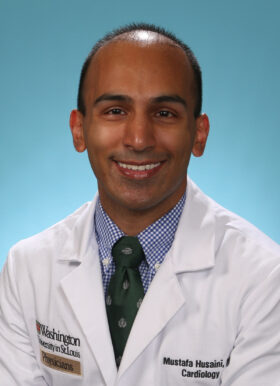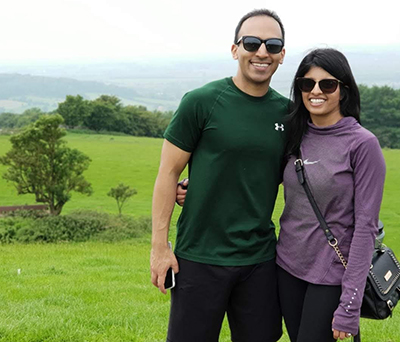Mustafa Husaini, MD

Mustafa Husaini, MD is a cardiologist who specializes in sports cardiology, hypertrophic cardiomyopathy, cardiopulmonary exercise testing, cardiovascular prevention and wellness, and general cardiology.
Dr. Husaini sees patients at:
- Barnes-Jewish West County Hospital Medical Building 3, Suite 100, 1020 N. Mason Road, St. Louis, MO 63141
Please call 314-362-1291 for an appointment.
What happened in the course of schooling to influence you to choose your specialty?
I’ve been fortunate to have some great mentors along my educational journey. During training, I would often ask my seniors why they chose their career field. The majority of them reported that it was because of a great mentor they had.
During my third year of medical school, I met an interventional cardiologist who would become my primary mentor. He was extremely intelligent and a genuinely nice person. Not only did we do a great deal of research together, spent a lot of time talking. He helped me think through what I wanted to do with my life. I realized I wanted to be like him.
Once you see yourself doing something, and you believe that you can do it, the rest is history.
What brought you to Washington University?
The reputation of Washington University proceeds itself — this is a great institution and a nationally known cardiovascular center. My research mentor in medical school did his training here and he told me a great deal about the program.
When deciding where to apply for my Fellowship, I was not sure which field of cardiology I potentially wanted to specialize in. While I liked interventional cardiology, during my residency I grew to really like electrophysiology and critical care.
I found that Washington University had amazing exposure to all things cardiology, including interventional cardiology program, heart failure, electrophysiology, critical care and adult congenital heart disease (among others). There was a breadth of learning possibilities that would give me the opportunity to be exposed so many aspects of cardiology.
The structure of the Fellowship program also appealed to me. A majority of our clinical responsibility is in the first two years, and the third year is “choose your own adventure.” I liked the flexibility that once you have figured out what you want to do, you can improve yourself at your own pace and style. That was really important to me and I knew this was the place for me.
Which aspect of your practice do you find most interesting?
I am a general cardiologist by training, but my main practice is sports cardiology. That means we take care of anyone who is active or is thinking about becoming active – not just the competitive athletes. Our goal is to help people stay safe when they are active, exercising and enjoying life. People have different levels of activity, but all have cardiovascular needs and risks to be discussed. They all have a goal in mind and we want to make sure they can achieve that goal.
Because my other interest is medical education, I’ve always been proud of my ability to communicate with my patients. I enjoy walking them through their symptoms, diagnosis, and management plan. It is important to make sure my patients understand what’s going on, what they can expect, what the prognosis is and what they can do to improve their own health.

Can you talk about staying active if you have hypertrophic cardiomyopathy (HCM)?
HCM was once thought to be one of the most common reasons for sudden cardiac death in athletes – and that is one reason I was drawn to this field. We had a patient who had a passing out event and we were concerned for a recurrent event. This patient was also a very active runner and wanted to continue exercising.
HCM is a fairly common condition that affects a lot of people. It is possible to monitor those who have HCM, evaluate their overall risk and determine safer heart rate zones to help them stay active, if possible. For those high-risk individuals, we take a shared decision approach with them to determine their safe and appropriate activity level.
While that may seem like trying to navigate between Scylla & Charybdis (for those who aren’t versed in Greek Mythology, this means trying to choose the lesser of two evils), there is evidence that moderate level physical activity is safe in patients with HCM.
Even more encouraging is that there are randomized ongoing studies looking at the safety of higher levels of physical activity. Currently, one thing we like to do within our Sports Cardiology Clinic is to help determine safe heart rate zones where the levels of stress hormones are unlikely to lead to sudden cardiac arrest.
Cardio pulmonary exercise testing is used to determine the patient’s anaerobic (high intensity exercise) threshold where exercise intensities after this point – measured by their heart rate – are associated with higher levels of stress hormones that could lead to sudden cardiac death. This is where we encourage our patients to be mindful of their heart rate and where fitness trackers such as Apple watches and Fitbits can be very helpful in monitoring heart rates during exercise.
We take all these factors into account as we consider what kind of activity is safe for people with cardiovascular conditions.
What new developments in your field are you most excited about?
One of the main reasons I became interested in sports cardiology was because the tide was changing for recommendations given to competitive athletes who also had any form of heart disease. The traditional advice for those at-risk athletes was to completely restrict activities. Over the last 10 years, we have gained a better understanding that, with the proper guidelines, exercise can be safe – based on the type and duration of the activity.
While there is still much to learn, the most recent data within our field demonstrates that some form of exercise is safe in almost every cardiac condition. It then becomes a shared decision-making process with the patient to determine when it is safe to continue exercising, when to exercise at a lower intensity, and when restrictions are needed.
Today’s fitness trackers and exercise programs that monitor heartrate are very helpful in determining exercise intensity limits for our patients. They incorporate ideas from cardio pulmonary exercise testing, not only giving us a better understanding of the physiology, but how we can use it to help our patients improve their lives.
Can you talk about the importance of seeing your physician for heart care during COVID?
We need to be smart and we need to be careful. Heart attacks and strokes can potentially be prevented through regular care from a physician. There is no reason someone with a treatable cardiac condition should delay getting medical attention because of COVID concerns. During these times of COVID, our safety protocols allow us to still take care of everyone’s medical needs while being socially distanced to minimize the transmission of this virus.
Where are you from?
I was born and raised in Michigan — grew up in the suburbs of Detroit. I did my initial medical training at Michigan State University in Grand Rapids, Michigan, before going to upstate New York and the University of Rochester for my residency. I came south to St. Louis for my Fellowship and since then have been able to enjoy a mild winter for the first time in my life!
Growing up in Michigan, did you spend a lot of time at the Great Lakes?
A lot of my friends had parents who owned cabins on various lakes, so we spent a lot of summers on the water.
When I was in Grand Rapids, Lake Michigan was just 45 minutes away. We would often just go to the beach, have a bonfire or relax in the water. It was fun being surrounded by water and nature. I can’t wait to explore the lakes, rivers and parks of Missouri.
Which particular award or achievement is most gratifying to you?
I love to teach residents, fellows and my patients. I am really proud of thinking of ways I can simplify technical information that allows students and patients ways to create their own foundation of knowledge and understanding. That’s what is most gratifying to me on a daily basis and is something I really enjoy.
What is the best advice you’ve received?
This question was really hard. But I think the reason it is hard is because I didn’t really want to admit it was advice from my dad! He used to give my siblings and me phrases, parables and maxims that I hated hearing when I was a child. At the time, they seemed so cliché. He would take 20 minutes to give a three-minute lecture.
But as I’ve grown up, I’ve realized how important and how right he was about everything. Sticking with your family, doing what’s right and being a good person. When you are a kid, you don’t want to hear advice, you just want to play games.
I now realize all that advice from my dad helped me become the best person, best father, best son, and best doctor I can be.
If you weren’t a doctor, what would you want to be?
Honestly, I have no idea. I love what I do. I thought about my hobbies as potential careers, but then realized I’m not really good at my hobbies so that makes it kind of hard. If I had the scope and talent I would be a chef, a professional athlete or would work in corporate finance.
I do have to say that I love to cook. In college I would watch a lot of food network. One of my favorite hosts was Alton Brown, as he would teach the science behind the cooking and techniques. After practicing on all of my roommates in college and residency, I’ve been able to cook for my wife now! Improving my culinary skills has been a fun side adventure and now that I think of it, let’s go with becoming a chef!